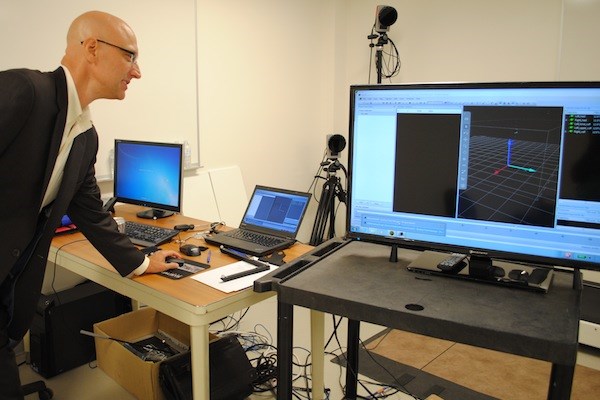Study Conducted in Health Assessment Lab

10/19/2015
By Karen Angelo
Each year, millions of people age 65 and older fall, according to the Centers for Disease Control and Prevention. More than 700,000 people a year are hospitalized after a fall, most often because of a head injury or hip fracture.
What leads to poor mobility in older adults? And more importantly, what can be done about it?
To find answers, Assoc. Prof. Eric James of Physical Therapy is conducting research in the Health Assessment Lab located in Riverview Suites. The fall prevention study is one example of the type of research that can take place in the Health Assessment Lab. The lab moved to the newly opened second phase of Riverview Suites – a 250,000-square-foot facility that also includes a residence hall for 800 students, 10 classrooms and a fitness center.
“It’s an interdisciplinary lab where we integrate health fields such as clinical laboratory sciences, ergonomics, exercise physiology, nutrition, nursing and physical therapy with related fields such as biomedical engineering and more,” says Dean Shortie McKinney of the College of Health Sciences. “The central location of the lab gives students, faculty and study participants easy access to state-of-the art lab space and equipment.”
Equipped with phlebotomy and specimen preparation areas, an interview and orientation room for participants, changing room, student workplaces and equipment, the 2,873-square-foot lab space is available for researchers across disciplines to collaborate on projects with health sciences faculty.
Assessing Mobility of 200 Older Adults
Working with his Research Co-op Scholars and directed-study students, James recruited 200 seniors from the community to participate in the study, assessing their coordination, mobility and physical activity.
“We found that older adults with poor ankle coordination are 15 times more likely to have mobility limitations and 7 times more likely to have fallen compared to older adults with good ankle coordination,” says James.
Pre-med student Sarah Cote helped gather data using a motion capture system, a gait mat and questionnaires to clinically assess function and activity level of study participants.
“Conducting research with a specific population in the effort to increase their quality of life is very rewarding,” says Cote. “I have particularly enjoyed this research because it has a purpose of increasing mobility and function in the elderly who struggle to maintain independence and quality of life as they are getting older. I can only imagine their struggle and frustration with decreased motor coordination and, subsequently, an inability to keep participating in the things they love to do."
James and his team of students are pilot-testing a new intervention of synchronizing movements with a metronome to improve the coordination of older adults with mobility problems. In collaboration with faculty at the UMass Medical School, Harvard Medical School and UMass Boston, he is testing to see if the intervention also leads to improved brain activation patterns. The study participants will get an MRI at UMass Medical School before and after the intervention.
“The theory is that coordination training may help reverse the decline in brain function that commonly occurs with aging and loss of mobility,” says James who is applying for a five-year grant from the National Institutes of Health to conduct a larger study.
